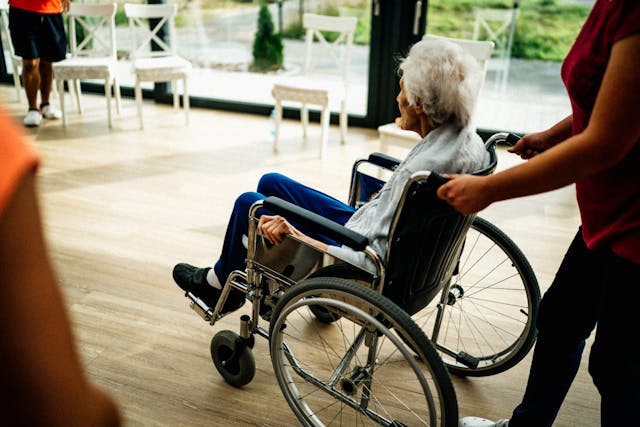- Caregivers must recognize and accept their emotions, including sadness and grief.
- Journaling provides a therapeutic outlet for processing complex emotions effectively.
- Seeking support from friends, family, and professionals is crucial for caregivers.
- Prioritizing self-care through activities like meditation and hobbies is essential.
- Connecting with hospice care and support groups can provide invaluable assistance and solidarity.
Taking care of a dying loved one is one of the most testing experiences anyone can face. It’s a time filled with complex emotions, from profound sadness to overwhelming stress. As caregivers, we often find ourselves navigating uncharted emotional territory, trying to provide comfort and support while grappling with our own feelings. This article will explore some common emotions caregivers experience and strategies for coping with them during this difficult time.
Understanding Your Emotions
Acknowledging Your Feelings
As a caregiver, it’s essential to recognize and accept the full range of emotions you may be experiencing. From sadness and grief to anger and guilt, each emotion is valid and deserves acknowledgment. Suppressing these feelings can lead to burnout and resentment, so allow yourself the space to feel and express them.
Journaling as a Therapeutic Outlet
One helpful way to process your emotions is through journaling. Writing down your thoughts and feelings can provide a sense of release and clarity. Try to set aside time each day to jot down your reflections, whether it’s in the form of free writing or structured prompts. It can be surprising how therapeutic putting pen to paper can be in times of emotional turmoil.
Seeking Support from Others
Don’t underestimate the power of reaching out to friends, family, or support groups for assistance. Sharing your experiences with other people who have also experienced caregiving can provide comfort and validation. Additionally, consider availing of professional help from a therapist or counselor who specializes in grief and loss. They can offer valuable guidance and support as you navigate this challenging journey.
Managing Stress and Anxiety
Practicing Self-Care

As a caregiver, it’s you can easily neglect your own needs while focusing on your loved one. However, self-care is crucial for maintaining your physical and emotional well-being. Make time for activities that bring you joy and relaxation, whether it’s taking a walk in nature, practicing mindfulness meditation, or indulging in a favorite hobby. Remember, you can’t pour from an empty cup, so prioritize self-care as an essential part of your caregiving routine.
Setting Boundaries
Learning to set boundaries is essential for preserving your mental and emotional health as a caregiver. It’s okay to say no to additional responsibilities or requests that feel overwhelming. Establish clear boundaries with family members and healthcare providers to ensure you have the support and space you need to recharge and replenish your energy.
Utilizing Relaxation Techniques
In moments of heightened stress and anxiety, practicing relaxation techniques can help calm your mind and body. Deep breathing exercises, progressive muscle relaxation, and guided imagery are all effective methods for reducing stress levels and promoting a sense of peace and tranquility. Incorporate these techniques into your daily routine to help manage the emotional rollercoaster of caregiving.
Coping with Grief and Loss
Honoring Your Loved One’s Memory
Grieving is a natural and necessary part of the caregiving journey. Allow yourself to mourn the impending loss of your loved one and honor their memory in meaningful ways. Create a memory book or scrapbook filled with photos and mementos, write letters expressing your thoughts and feelings, or hold a memorial service or celebration of life to commemorate their legacy. Finding ways to keep their memory alive can bring comfort and solace during this challenging time.
Finding Meaning in the Journey
Despite the pain and sorrow of caregiving, many caregivers find meaning and purpose in their role. Reflect on the positive moments and cherished memories you’ve shared with your loved one throughout their illness. Focus on the love and compassion you’ve shown them, knowing that your presence and support have made a profound difference in their final days. Finding meaning in the caregiving journey can help ease the burden of grief and bring a sense of fulfillment and peace.
Seeking Support from Healthcare Professionals
Connecting with Hospice Care
 Hospice care provides specialized support and resources for both patients and their caregivers during the end-of-life journey. A hospice nurse is trained to provide compassionate care and emotional support to patients and their families, helping them navigate the physical, emotional, and spiritual aspects of dying with dignity and comfort. Reach out to hospice services in your area to learn more about the support they offer and how they can assist you in your caregiving role.
Hospice care provides specialized support and resources for both patients and their caregivers during the end-of-life journey. A hospice nurse is trained to provide compassionate care and emotional support to patients and their families, helping them navigate the physical, emotional, and spiritual aspects of dying with dignity and comfort. Reach out to hospice services in your area to learn more about the support they offer and how they can assist you in your caregiving role.
Participating in Support Groups
Many hospice organizations offer support groups specifically for caregivers, providing a safe and nurturing space to share experiences, receive guidance, and find solidarity with others who are on a similar journey. Connecting with fellow caregivers can offer validation, encouragement, and practical tips for coping with the challenges of caregiving. Consider attending a support group either in person or online to connect with others who understand and empathize with your experience.
Caring for a dying loved one is undoubtedly one of the most emotionally demanding experiences anyone can face. As caregivers, we must acknowledge and honor our emotions, prioritize self-care, and seek support from others, including healthcare professionals. By understanding and coping with our emotions, we can navigate this challenging journey with grace, compassion, and resilience, ultimately finding healing and peace amidst the pain and sorrow. Remember, you are not alone, and help and support are always available for those who seek it.
